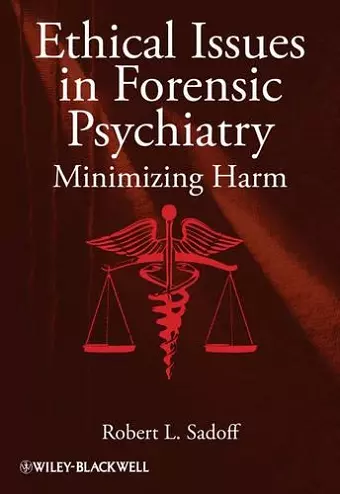Ethical Issues in Forensic Psychiatry
Minimizing Harm
Format:Hardback
Publisher:John Wiley & Sons Inc
Published:10th Dec '10
Currently unavailable, and unfortunately no date known when it will be back

Ethical medical practice and treatment in psychiatry are based on the concept of first do no harm. However, this cannot, and does not, apply to forensic cases where there is no doctor–patient relationship and the forensic psychiatrist may indeed cause harm to the examinee. In this book, Robert Sadoff analyzes the ethical issues affecting forensic psychiatric practice, especially those promulgated by the American Academy of Psychiatry and the Law. Within those guidelines, he looks at individual bias, vulnerability of the examinee, and potential harm to the mental health professional. The book discusses each of the procedures of the forensic expert separately with respect to minimizing harm. It has been written with an international audience in mind and features chapters reviewing the European and UK perspectives, by Emanuele Valenti and John Baird, respectively.
Robert Sadoff addresses the long-term harm that can be either avoided or minimized through careful planning and application of ethical principles. He is not advocating that the harm can be totally eliminated, because that is impossible in the adversarial system in which forensic psychiatrists work. However, there are means by which harm may be minimized if care is taken during the assessment, the report writing, and the testimony phase of the proceedings. The book develops the scope of forensic psychiatry from the standpoint of administrative, civil and criminal cases. It presents the practical issues involved in conducting forensic psychiatric assessments under various conditions plus special considerations, such as bias, minimizing harm, developing a therapeutic approach, and elaborating on various vulnerable individuals who are frequently examined in forensic cases. These include juveniles, mentally retarded, autistic, sexual assault victims, the elderly, the organically damaged, the psychotic, and mentally disabled prisoners. Immigrants are covered in a chapter by Solange Margery Bertoglia. The ethical issues in conducting forensic psychiatric examinations and presenting psychiatric testimony in court are examined and discussed. Cases illustrating the difficulties involved punctuate the presentation. The book closes with a fascinating account of the legal perspective by Donna Vanderpool.
In summary, this book illustrates the ethical and practical issues that affect forensic psychiatric practice. The question is not what we do, but how we do it, and which standards, ethical guidelines and personal values contribute to the total picture. Despite the fact that we...
"Sadoff's book is a vital contribution to the psychiatric literature, as it fills a need unaddressed by more theoretically oriented works. Anyone interested in mental health or medical ethics will find this text worthwhile, especially as it contains an introduction for lay readers explaining basic forensic roles and functions.The book is most valuable, however, to forensic mental health practioners, who will benefit from its practical instruction aimed at minimizing harm." (Journal of Clinical Psychiatry, December 2012)
"Sadoff has crafted an admirable mix of facts and anecdotes, presented in a manner
that could help undergraduates get a taste for the realities of forensic practice, help graduate
students connect the theoretical with the practical, and even provide veteran practitioners
with helpful reminders and provocative food for thought." (PsycCRITIQUES, 23 November 2011)
"It will serve as a useful resource and is a welcome addition to my library." (Doody's, 11 November 2011)
"While Ethical Issues in Forensic Psychiatry appears to be targeted at the forensic psychiatrist, as emphasised in the title, I believe that it can be valuable reading for all forensic mental health professionals. . . Ethical Issues in Forensic Psychiatry makes practical ethics easy reading. . . This book is an invaluable guide to ethical practice." (Journal of Mental Health, 1 October 2011)
ISBN: 9780470670132
Dimensions: 252mm x 175mm x 20mm
Weight: 594g
256 pages